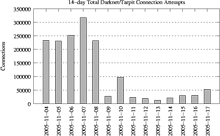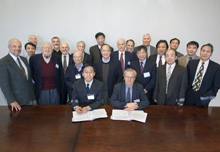 | Tuesday, November 29, 2005 |
|
Tuesday, November 29 |
|
Extended Forecast |
Secon Level 3 |
|
Tuesday, November 29 - Chicken and Rice Soup - Cowboy Burger - Baked Meatloaf with a Roasted Tomato Demi-Glace - Parmesan Baked Fish - Peppered Beef - Ham and Pastrami Calzones - South of the Border Burritos with Chips and Queso The Wilson Hall Cafe accepts Visa, Master Card, Discover and American Express at Cash Register #1. |
|
Wednesday, November 30
Thursday, December 1
Chez Leon Menu |
| Fermilab Today is online at: http://www.fnal.gov/today/ Send comments and suggestions to today@fnal.gov Fermilab Today archive Fermilab Today PDF Version Fermilab Result of the Week archive Fermilab Safety Tip of the Week archive Linear Collider News archive Fermilab Today classifieds Subscribe/Unsubscribe to |
|
Caution is Key to Computer
Security at Lab, Home
|
||
|
||
|
Every day, hundreds of thousands of attempts are made to attack Fermilab's computers. On November 7 alone, the Computer Security Team saw more than 300,000 attempts on the lab's network. "You let your guard down just for a few minutes and it can spread like wildfire throughout the laboratory," said Computer Security Team member Irwin Gaines, adding that some labs have taken themselves temporarily offline because of computer infestation. Fermilab hasn't had to take such action, and there's plenty you can do to keep it that way, he said. First, verify that you have a network administrator, a person or group that monitors and installs security updates on computers in your department, division or experiment. Fermilab has a system that will automatically install the latest patches and virus signatures as they become available, and administrators will ensure that your computer is hooked up to this system. Verify the administrator of the system you are using with a registered node search. Remember that your computer isn't safe once you've left the lab; in many cases it's more vulnerable. "If you take your laptop home and your kids play with it and download something and then you bring it back to work, not only are you infected at home, but now you come back to the lab and infect us as well," said Computer Security Manager Mark Leininger. To avoid being a hacker's target, be leery of unexpected email attachments, links and HTML email from unknown sources and turn off any services on your computer that you don't need. One key reminder: downloads advertised as "free" can expose your computer to attacks. "If you try downloading music for free from the Internet, guess what, you're downloading a lot more than just free music," said Computer Security Team member Joe Klemencic. "It's all about money these days." An incident may not only affect Fermilab; it could affect you personally as well. It is all too common for a virus or other software to capture your keystrokes and send off your credit card numbers, social security numbers and bank logins.
For a look at how viruses can affect a computer, watch this video.
|
| Fritz Lange, Former Fermilab Employee, Has Passed Away |
|
Fritz Lange, 67, who worked at Fermilab for 23 years, died of a brain tumor on Thursday, November 24 at his home in Naperville. Lange began his career at Fermilab in 1982 on the Antiproton Source project. In 1994, he became head of the Accelerator Division's Mechanical Support Department. Lange helped design and install the DZero detector, and contributed to developing the accelerator complex including the Main Injector. He retired May 11, 2005.
Visitation will be from 1p.m. to 8 p.m., Wednesday, November 30, at Friedrich-Jones Funeral Home, 44 S. Mill St., Naperville. A burial Mass will be held at 11 a.m. Thursday, December 1, at SS Peter and Paul Church.
|
| From the Chicago Tribune, November 19, 2005:
U.S. science 'in a crisis,' says Nobel winner Among Chicago's vast science community, Leon Lederman may be the most widely known. Before leaving as director of FermiLab in 1989, Lederman was awarded a Nobel Prize in physics, and he has become an advocate of science education. First at the University of Chicago and then at the Illinois Institute of Technology, Lederman taught physics to undergraduates after becoming FermiLab's director emeritus.
His passion for science has played out in various initiatives intended to improve the quality of science teaching in Chicago-area schools and nationally. Lederman embraced a national report issued in 1983 declaring the United States to be "a nation at risk" due to the declining quality of science education.
|
|
November 23 - 28 - No stores established due to Tevatron B17 work. - Pbar's lithium lens fails. - Experts report that the B17 bypass is okay. Read the Current Accelerator Update Read the Early Bird Report View the Tevatron Luminosity Charts |
|
Fermilab Singers Mark your calendars for December 15! The Fermi Singers are preparing a winter concert for your listening pleasure. It will be at noon in the Ramsey Auditorium - just 30 minutes and treats to follow!
NALWO's Winter Holiday Tea |

